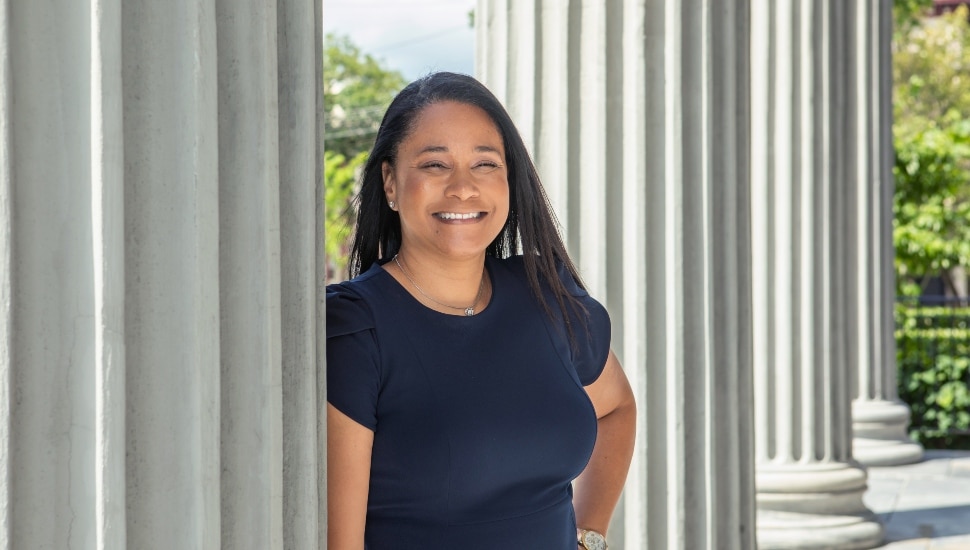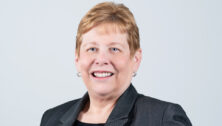Chester County Leadership: Jamila Winder, Chair, Montgomery County Board of Commissioners

Jamila Winder, Montgomery County Commissioner and Chair, spoke with VISTA Today about growing up in East Norriton with parents who instilled ambition and work ethic in the form of music and sports. During college at Penn State, she continued exploring her love of music by becoming a radio DJ for an R&B show.
Winder decided to run for her local school board to give back to the community, then was elected to the Montgomery County Board of Commissioners last year. She discussed her priorities as Commissioner, including housing, opioid addiction, economic development, and employee experience, as well as the personal experiences that shaped her views.
Where were you born and where did you grow up, Jamila?
I was born at the Medical College of Pennsylvania in Philadelphia. My mom was an Educator. My dad was an Assistant Warden in the state prison system, and he got his start at Eastern State Penitentiary. As my dad evolved in his career, they decided to move their young family out to East Norriton Township in Montgomery County when I was five.
Where were you in the pecking order?
I was the oldest. There are five years between my brother and I. My mom was very strict in terms of how we excelled in education. She kept us very busy in extracurricular activities. I played the piano and viola and did sports. My mom spent a lot of time instilling a certain expectation in terms of how we show up and how we behave.
What sports did you play when you were growing up?
I ran track. In eighth grade, we ran in the Penn Relays. We won a cookie, which is a medal from the Penn Relays. We won the gold medal that year in the girls’ 4×100. I was on the front page of the Times Herald.
In high school, I ran track and field, did cross country, and did indoor track. It was never a goal of mine to do sports at the collegiate level, but I found a lot of great friendships.
Did your parents allow you to work when you were growing up?
I did work. It was secondary, not necessary, but I worked for Giant Foods. There was a local pharmacy called Mario’s Pharmacy in East Norriton, and I locked up and ran the lottery machine.
My mom was a College Readiness Counselor in Philadelphia. She made sure that I did summer immersion programs so that I could explore careers every summer. I went to Penn State for two summers, and then I went to the Community College of Philadelphia. I did a lot of exploration around STEM careers or careers that wanted to give more visibility to women. My mom kept us focused on the extracurricular activities outside of academics.
What do you think that focus did for you, looking back? Did it give you an edge or a leg up?
My upbringing gave me a leg up in that I was fortunate enough to have two parents and a grandmother who centered our lives on education. I can’t say I understood why then, but I can reflect on how busy my mother kept us. That left me with an openness and a willingness to try new and different things and a diversity of perspectives and experiences, whether it be heading into college or heading from college into the workplace.

Your mother worked hard. She always kept you busy. That work ethic came into play too, right?
Absolutely. My grandmother raised my mom as a single mother. Work ethic and always striving to do your best has been carried on for generations.
What kind of music floated your boat back when you were a teenager and in college?
I’ve always been into music. There was a radio station at Penn State, an AM station, where they were inviting students to become DJs. I started in my freshman year as a radio host. I hosted a weekly hour-long program where I would play everything from R&B to rap to alternative music.
Fast-forward to my sophomore year, and I went on the FM station and ended up with a daily evening program from 9-11:00 PM. It was hip-hop and R&B. I had a co-host, and every week for two hours, we talked about things that women face at our age. We talked about popular music and artists. We got a lot of fan mail.
You could have gone anywhere for college. Why Penn State?
Penn State had an awesome reputation. I did a lot of college tours. During spring break, I visited HBCUs. My mom took me on several college tours around the state. Penn State just felt like the right fit for me. I was proud that it was my dad’s alma mater; he went to Penn State at night when he was at Graterford. And my mom knew the college recruiter very well because she covered southeastern Pennsylvania. I spent multiple summers at Penn State before even applying.
Was Penn State a good choice for you?
I’m a social butterfly. I had a couple of friends or acquaintances. But I got involved in a lot of different things very quickly. Sometimes, as an African American or as a person of color, when you have an institution the scale and size of Penn State, you can feel very lost and not connected because you don’t see a lot of people who look like you.
But, going back to what my parents modeled and the exposure, I had been around different groups of people, both alike and not so alike, so when I got to Penn State, I had a bunch of friend groups.
As you started your career, who were the people who saw promise in you and opened up doors for you, Jamila?
My first mentor was a man named Todd Lucca. We spent a decade together on my first real job at the online subsidiary of Drexel University. He was the Chief Revenue Officer. He came in shortly after I got there. I was maybe 23 years old. I remember sitting down with him in his office when he first came on board and saying to him, “I want to be a manager and I want to make x number of dollars by the time I’m 30.” I was very sure and confident of myself, and he made a commitment and a promise to me. He would always say, “Fail my way first, and I promise you won’t fail.” He took me under his wing for every step of my career journey at Drexel for those 10 years.
What do you think Todd saw in you?
He saw my intestinal fortitude and emotional intelligence. In that line of work, we were going out and talking to large Fortune 500 and Fortune 100 companies about their talent strategy, and their workforce development strategy. You had to have the ability to connect with people and read people. He’d always say, “I can teach aptitude. I can’t teach attitude.” He saw that I had the right attitude and willingness to learn and take critical feedback.
Eventually, there was a change in leadership, and he was going to be elevated to the senior team. He called me when I was at a conference in Baltimore. I think I was just shy of 30. And he called me with the then-president at the time and said, “You’re going to be the new Vice President of Business Development. You’re going to take over my role.” I had never been a Vice President. I had never been at that level. That’s really where I got my executive experience.
That’s a great story. Anybody else you want to mention that saw promise in you and opened up a door or two along the way?
There’s another woman. Her name is Esther Benjamin. We were working at the same organization. She was the Chief Benefits Officer. She had worked, I believe, as an Obama fellow and was politically astute but also brilliant and had had a successful career. Again, working in a large organization, trying to find your way and be taken seriously as one of a few women of color — she saw something in me, even though we didn’t collaborate on a lot of things. She took me under her wing as a successful woman of color.
So, when did the political bug bite?
In 2017, I ran for school board. My dad, after retirement, worked for Norristown Area High School as a part-time Security Guard. I remember finding out that there were several vacancies on the Norristown School Board. I wanted to run for school board because I was successful in my career, but I felt like I wasn’t giving enough of my time and talent to a cause. I felt that I had a responsibility to do more.
I didn’t know the first thing about running for office. It was a very competitive race with a very competitive primary. But again, in the spirit of that willingness to learn, I attached my wagon to people who know what they’re doing and are good models of what good government looks like. I was able to successfully secure a seat on the board in 2017 and was with the district through COVID-19.
Then, there was a board vacancy when Amanda Cappelletti went to the state Senate. I love education because that’s core to who I am, but I wanted to try something different. And there had never been anyone who looked like me sitting on the board in the 40 years that I had lived there. So I got an appointment and then had to run for that election.
Let’s talk about your current challenges and opportunities. What are you focused on right now?
We have an affordable housing and homelessness crisis in Montgomery County. It’s hard for working families to find an affordable place to live. So, we’re thinking through a wide range of solutions. You look at the housing continuum to address those issues and be innovative and radical about it. “Radical” doesn’t have to be a bad word, right? It also means thinking outside the box. And it takes that kind of thinking to figure out a solution to this challenge. More than 400 people are sleeping on the streets. It’s too many. So that’s priority number one.
Another thing is thinking about the employee experience. We have the most generous paid parental leave policy in the Commonwealth. Someone who works for Montgomery County can take up to 16 weeks if they have a medical complication after the birth of a child. We’ve done things like re-evaluating our benefits. We did a comp study. We’re thinking about ways to address employee wellness. When our employees are excited to come to work every day, they’re going to better deliver for the residents of Montgomery County.
The other areas I’m working on are with vulnerable populations, whether it be our seniors or those who are struggling with mental health and opioid addiction, like my brother. We’ve been telling that story of our family. We’re looking at our programming and making sure that it is lifting up and helping our most vulnerable friends and neighbors, ranging from children to those with disabilities.

I talk a lot about family, and I think what makes me a little bit different is I’m coming to this office not only with professional experience and having governed before, but with real lived experiences that can help me be empathetic to my fellow friend and neighbor. I cared for a very long time for my mother who was disabled. My brother has struggled with opioids and is doing well now. These are the things that make your elected official more real and connected. That really guides what I do.
And then the last priority I’ll mention is economic development. I cut my teeth in workforce development and better partnerships with business and industry. The governor has been talking a lot about Main Streets Matter. We’re building this Justice Center project, but we have an opportunity to help Norristown revitalize downtown Main Street. I’m always thinking of ways I can use my office to forge partnerships with council, community leaders, and our state legislature to revitalize our Main Streets, like in Lansdale and Pottstown.
So, what do you do with all that free time that you have?
I’m married. I have a four-year-old at home. We like to go out and do family things. We love to frequent water parks. My kid loves to swim. We love to go out for a nice meal.
Three last questions for you. What’s something big, Jamila, that you’ve changed your mind about over the last five or 10 years?
I would say addiction. Our family, my brother, has been in this struggle for a little over a decade. It’s easy when you’re not the addict to superimpose a view like, “Oh, you don’t need to use drugs,” or “It’s easy to quit.”
In the last five years, especially being a public servant and working here in Montgomery County where we do a lot of work around recovery and addiction and mental health services, I have completely changed my mind about addiction and how it affects people and how it affects families. I think part of that was because I got educated on it.
So now, as commissioner, I have that lens and perspective that I can also use to attempt to change other hearts and minds because not everybody feels the way that I feel around people who are struggling.
It’s a crazy world out there, Jamila. What keeps you hopeful and optimistic?
I think what makes me hopeful is the fact that we have a generation coming behind us. When I look into the eyes of my little innocent four-year-old, he gives me hope in the promise of possibilities to keep fighting for a better tomorrow. When I spend time working with youth, children, and babies, that gives me hope that despite all the crazy that’s going on, we have an opportunity and a responsibility wherever we sit to make the world a better place for kids.
So I think dropping my kid off to school every morning and picking him up every afternoon restores my sense of purpose, especially when the days get hard.
Finally, Jamila, what’s the best advice you’ve ever received?
Oftentimes as women, as women of color, we face this imposter syndrome that we can’t. We don’t go for that job. We don’t go for that new opportunity. We don’t take that promotion because of that imposter syndrome.
The best advice that my grandmother gave me was that I can dare to be anything I want to be. I carry that with me, especially heading into this commissioner race and the commissioner appointment. I carry that with me so I stay grounded and remember that every opportunity is a possibility for me.
They both must have been so proud of you.
They were. My mom came to my swearing-in on Jan. 2. I’m living proof of their sacrifice. While I miss my grandmother and my mom, I keep saying that all they poured into me, all they instilled in me, is what carries me through.
Connect With Your Community
Subscribe to stay informed!
"*" indicates required fields










![95000-1023_ACJ_BannerAd[1]](https://vista.today/wp-content/uploads/2023/03/95000-1023_ACJ_BannerAd1.jpg)









































